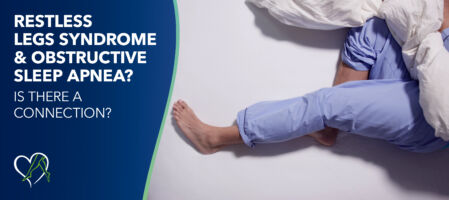
If you're dealing with restless legs syndrome (RLS) or obstructive sleep apnea (OSA), you're likely aware of the disruptive impact they can have on your sleep. While RLS and OSA are two distinct sleep disorders, did you know there could be a connection between the two? Recent research suggests RLS and OSA often co-occur, and understanding this potential link could empower you to manage both conditions better and enjoy a good night’s rest.
According to the National Institute of Neurological Disorders and Stroke (NIH), restless legs syndrome (RLS), also known as Willis-Ekbom Disease, is a neurological disorder characterized by an irresistible urge to move the legs, often accompanied by unpleasant sensations such as tingling, burning, or crawling feelings. These symptoms typically worsen during periods of rest or inactivity (such as during travel while watching a movie) and are temporarily relieved by movement.
RLS can occur at any age but is more prevalent in middle-aged and older adults, affecting approximately 7-10 percent of the population, per Yale Medicine.
Because restless legs syndrome (RLS) can significantly interfere with your sleep, making it challenging to fall asleep or get back to sleep after waking up, the condition can lead to symptoms related to sleep deprivation, such as:
There is no test for RLS. The condition is diagnosed based on a doctor’s assessment of symptoms that cannot be explained by any other medical condition, including an irresistible urge to move the legs, symptoms that get worse while at rest that are relieved by movement, and leg movement that is worse at night.
Obstructive Sleep Apnea (OSA) is a sleep-related breathing disorder characterized by repeated episodes of partial or complete obstruction of the upper airway during sleep. This obstruction leads to disruptions in breathing, causing oxygen levels to drop and sleep fragmentation. OSA is associated with various health risks, including cardiovascular disease, metabolic disorders, and cognitive impairment.
Common symptoms of OSA include loud snoring, gasping for air during sleep, and daytime sleepiness.
Emerging research suggests a potential vein-related connection between restless legs syndrome and obstructive sleep apnea. While the exact mechanisms are not fully understood, several studies have highlighted intriguing links between these conditions and venous insufficiency or venous reflux disease.
One theory reported in ScienceDirect suggests that chronic venous insufficiency (CVI) and superficial venous reflux (SVR), conditions characterized by impaired venous return and fluid overload in the legs, may contribute to the development or exacerbation of both RLS and OSA.
In the case of RLS, the pooling of fluid in the legs due to venous reflux is thought to worsen the unpleasant sensations and urge to move the legs, particularly when lying down. Treating the underlying venous disease through minimally invasive outpatient procedures such as sclerotherapy, micro-phlebectomy, and radiofrequency ablation has significantly improved or even resolved RLS symptoms in many patients.
A study reported by the National Library of Medicine (NIH) found that OSA is associated with venous stasis and can increase the risk of venous thromboembolism (VTE) and deep vein thrombosis (DVT). This suggests that OSA may predispose individuals to venous disease, and venous disease may worsen OSA symptoms.
Center for Vein Restoration (CVR), America's largest physician-led vein center, offers comprehensive and nearly pain-free treatments for chronic venous insufficiency, which is thought to be a contributing factor in restless leg syndrome and OSA.
With 110+ centers in 22 states, 70+ active physicians, and a 98 percent patient satisfaction rating, Center for Vein Restoration provides state-of-the-art, compassionate, and accessible vascular care. Dedicated to continuously redefining vein care in the United States, CVRs board-certified vein physicians can evaluate your venous health and assess if vein treatment options may be a solution for your restless leg syndrome and obstructive sleep apnea problems.

Studies suggest that correcting venous insufficiency or reflux can effectively improve restless leg syndrome symptoms in many patients. While direct evidence for OSA is limited, addressing the venous component may provide a complementary approach to managing these comorbid conditions. Vein treatment options include:
Ultrasound-guided foam sclerotherapy
During this minimally invasive procedure used to treat varicose veins and other venous disorders, a foam sclerosant causes irritation and inflammation of the inner lining of the vein, leading to the vein walls sticking together. Over time, this results in the vein closing off and eventually being absorbed by the body.
Endovenous radiofrequency ablation (RFA)
A thin catheter is inserted into the vein and carefully advanced along its length using ultrasound guidance. The catheter releases radiofrequency energy, which heats targeted sections of the affected vein, causing it to seal shut. Blood flow is naturally redirected to healthy veins. Over time, the body absorbs the closed vein.
In a study titled Treatment of Leg Veins for Restless Leg Syndrome: A Retrospective Review, the combination of RFA and UGFS has been shown to significantly improve RLS symptoms in patients with underlying superficial venous reflux (SVR) or CVI. The study found that correcting superficial venous reflux improves RLS symptoms, suggesting an association between chronic venous insufficiency and restless leg syndrome. It concludes that a venous ultrasound study and intervention should be considered for potential patients.
The board-certified vein doctors at Center for Vein Restoration (CVR) are trained in all modern vein treatments to ensure the safest and most convenient patient experience. Every CVR vein center is IAC Accredited and has facilities evaluated and approved by the Intersocietal Accreditation Commission.

While restless legs syndrome and obstructive sleep apnea are distinct conditions, there is growing evidence suggesting a potential venous disease connection between them. By addressing both conditions using minimally invasive outpatient treatment options for vein disease simultaneously, individuals can improve their overall sleep quality and quality of life.
Center for Vein Restoration provides state-of-the-art vascular care compassionately and affordably. The doctors at the center are trained in all modern vein treatments to ensure the safest and most convenient patient experience.
Call 240-965-3915 to speak to a Patient Services Representative or schedule your consultation online at a CVR near you today.
